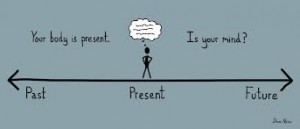A friend of mine recently wrote-off his Nissan Micra causing €6,000 damage to a car worth €2,000 (at best). It was a head on collision. It was entirely my friend’s fault as he was driving on the wrong side of the road!!! Luckily nobody was seriously injured, although my mate’s ego was severely deflated.
Now I could go so far as to say that it could have happened to anyone, after all he was just back in Italy from England where he was driving on the other side of the road every day for two months, but I’m not going to go that far because he was driving on the wrong side of the road for almost 2 km (1.2 miles)!!!
When I quizzed him about the situation I, inevitably, asked him how he managed to get so far without realising he was on the wrong side of the road. Alas his reply was… “Thoughts…”
WOW!!! His thoughts cost him his livelihood, without his car it was almost impossible for him to do his job. At least to the degree that he needed to survive.
This is a very common thing where peoples minds are literally crammed full of useless thoughts. Some call it internal chatter others claim to have voices in their heads. The reality is…
Most of us don’t own our own minds.

I almost had a serious accident on my mountain bike roughly a month prior to my friend’s accident while I was cycling to the beach. This lady was intersecting onto the road I was on. She was taking the curve at speed while chatting on her mobile phone, no loudspeaker, no hands-free kit. Luckily she saw me at the last millisecond after first having looked completely through me while checking for traffic.
It was at that moment that I felt the urgency to write about practising mindfulness.
I tried to declutter my mind through meditation some years ago and that involved clearing my mind of ALL thoughts. This proved impossible and discouraged me from deepening my meditative practice (which I now prefer to call practising mindfulness)
About two years ago I came across an exercise to help reduce the thoughts in my head to just one. At first I didn’t think much about it but I quickly realised that holding one solitary thought is so much closer to no thoughts at all. I just had to try it.
This mental exercise is simple, you just think of a happy memory from your past. Make it a good one, one you remember crystal clear when you close your eyes. All you do is think of that memory and try to hold it for as long as possible. You may be surprised to find that the memory only lasts for 10 or 15 seconds but don’t be discouraged, I believe my first recall lasted between 5 and 10 seconds.

I was shocked that so many everyday thoughts were competing against my happy thought so quickly. So I put this exercise into practice once a week on my way to work every Monday, the trip was roughly 20 minutes long. After roughly a year I managed to hold this one memory for 20 full minutes, if not longer.
With hindsight I wouldn’t advise anybody to practise this exercise while driving or operating heavy machinery, you’ll get much quicker results by doing it in silence and without having external distractions.
My close call with the car happened around a year and 8 months after I started practising mindfulness. On my way home from the beach that day I kept the idea to write this article in my head for the whole trip home (40 minutes)!!!

It was an interesting experience, after about 10 minutes of constantly repeating ‘practise mindfulness’ in my head my mind wandered (albeit in a specific direction). I started writing this article in my head (obviously without the premonition of my friends car crash) and my mind would only allow me to construct the article in my head two words at a time and after the two words my mind would, without fail, revert back to ‘practise mindfulness’.
This was weird and uncontrollable as I felt like an outsider looking in, just observing my thoughts.
This went on for almost another 10 minutes, I must have had 100 words “written” in my head when I became conscious of what my mind was doing and I got upset with myself for not succeeding in my initial goal of practising mindfulness and holding one single thought. Instantly a semi-professional cyclist overtook me and his sponsor was ‘Tinkoff’ a Russian credit company. So I thought to myself “what are the odds?” ‘Tinkoff’ could very easily be used to describe what I’m doing, turning off my thoughts. Plus I was looking for a way to fund a project I wanted to get off the ground and I read his t-shirt “Tinkoff Credit Systems”. A double whammy.

I took it as a sign, I then had two things to keep in my head, so I started ‘think off, practise mindfulness’. I then made it the rest of the 20 minute journey with only those four words going through my mind.
Although referred to as mindfulness, it could probably more accurately be defined as ‘practising (close to) mindlessness’. Another example of our language that tricks us.
My conclusion is that if everybody contemplates practising mindfulness we will have a more peaceful, relaxed, productive and present-orientated world. This, in my opinion, will also greatly reduce the amount of accidents that happen in our society.
Leave a comment with your experience of practising mindfulness. How do you do it? Some people’s hobbies automatically have them in this state of ‘conscious living’ be it knitting or jogging. Let me know what you do to turn off the back chat and get yourself ‘in the zone’.







